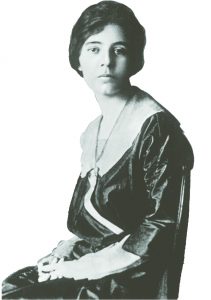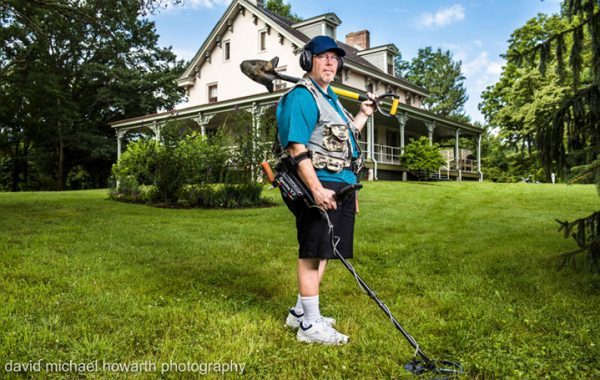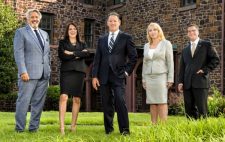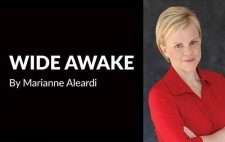 When land surveyor Michael Burns first proposed mining the grounds of Paulsdale – suffragist Alice Paul’s childhood home – no one thought he’d find anything all that interesting. Then again, this was a house dating back to 1883 sitting on six acres, so you never know what a history buff and his high-powered metal detector might find.
When land surveyor Michael Burns first proposed mining the grounds of Paulsdale – suffragist Alice Paul’s childhood home – no one thought he’d find anything all that interesting. Then again, this was a house dating back to 1883 sitting on six acres, so you never know what a history buff and his high-powered metal detector might find.
“The first or second day, I found a silver quarter and that got me hooked,” says Burns, a Mount Laurel resident who is a member of the South Jersey Metal Detecting Club as well as other history and archeology groups.
He spent 18 months surveying the land, running his metal detector in all kinds of weather, and sometimes waiting hours – and days – before unearthing anything. He also dove into historical research of the house, studying archeological documents, family histories and the wills of the past owners of the property.
In all, Burns was able to identify more than 30 items through online searches and other databases.
His search unearthed personal items, like the United States military service tags from 1940 that belonged to Alice Paul’s brother William. There was a Civil War era U.S. general service coat button, as well as a cooper ring engraved with the initials A.C. Through his research, Burns discovered that a tenant who lived on the land between 1860 and 1899 was named Andrew Cain. As for the button, Burns learned that William Hooton, son of the original owner of the property, served in the Civil War.
It’s especially rewarding to find personal items, Burns says.
“You’re the first person to pick that up since they dropped it,” he said. “You’re immediately connected to history that way.”
Also discovered was other evidence of life on the farm, including a shovel blade, a horse harness buckle and an iron plow blade. He found children’s toys, including a model gun from the 1940s and a lead cowboy figure from the 1950s. There were a handful of coins dating back to the late 1800s, including a 1922 Order of Railway Conductors convention piece and another from 1938 commemorating the 50th anniversary of Collingswood.
“We always tell visitors to Paulsdale that if you look and listen hard enough, the house will tell you things about its past,” says Lucy Beard, executive director of the Alice Paul Institute (API), which is housed at Paulsdale. “For instance, look at the floors and you can see where fireplaces were removed once they could install a furnace, or look at the marks on a brick wall to see where an early coal stove was affixed.”
So despite some initial uncertainty about Burns’ project, Beard wasn’t all that surprised that the search uncovered some historical treasures.
“Michael quite literally listens as he painstakingly traverses the property with his equipment, listening for the sound of iron and other metals buried inches below his feet. He uncovers clues to how the people here before us lived, worked and played,” Beard says. “Few people write or document their everyday lives on paper, so we are left with physical clues that Mike uncovers.”
A surveyor by trade, Burns first became interested in metal detecting as a fan of “The Detectorists,” a British sitcom about two guys in search of treasures. His interest is more academic than treasure-oriented however, and mining the grounds of Paulsdale has long been on his wish list. A member of the Surveyor’s Association of West Jersey, Burns says he learned in 1990 that Paul’s grandfather, William Parry, was one of the founding members of the surveyor’s organization.
Around the same time, API purchased the land, which it restored to the condition it was in when Paul lived there. Paulsdale runs as a museum and center for leadership development honoring Paul’s memory. The artifacts Burns discovered are now on display at the house, and earlier this year, Burns presented his findings at Paulsdale. He also posted them on YouTube under his tag name “All Metal Mike.”
And Burns says he has not completely closed the chapter on the Paulsdale dig. “It’s a site,” he says, “that still has more to give.”
What is Paulsdale?
Alice Paul is one of the main architects of the 19th Amendment, which provides women the right to vote. She grew up on this Mount Laurel property, now called Paulsdale.
Purchased by her parents William and Tracie in 1883, Paulsdale was their home and family farm until the 1950s. Although Alice left in 1901 to attend Swarthmore College, the home and its grounds served an important role in her evolution as a feminist. All four Paul children, both boys and the girls, were expected to work the land. Alice first became interested in equal rights through her mother Tracie, a member of the National Suffrage Association.
You can tour the home Tuesday through Friday from noon to 4 pm, and on the second Saturday of each month from noon to 2 pm. Cost is $5 per person.














